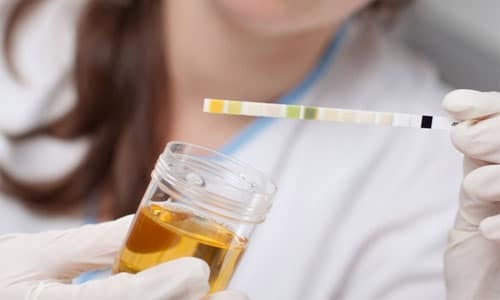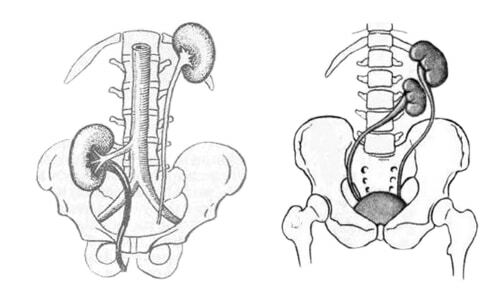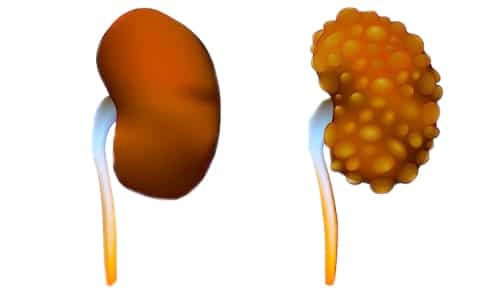Protein in urine plays the role of building material for every cell of our body. Molecules of protein are involved in every second in all internal processes. Protein molecules are usually large, so they can not pass through the renal filter, so only a small fraction of the protein( less than 1%) can leave the urine. But with the development of any structural renal disorders, the protein in the urine of men can show up in a much larger number. Then proteinuria is diagnosed.

Physiological Norm of Protein
Normally, a protein in the composition of urine should not exceed 0.3 grams. This is the upper threshold, because basically the protein contains much less. Just some circumstances lead to an increase in protein molecules in the urine:
- Stress states;
- Muscular overstrain;
- Heavy physical activity.
This explains the fact that in male urine, the level of protein is always slightly higher than in the female. The reason for this is professional activity and the image of male life.
If an increased content of protein molecules is found in urine, then it is recommended to retake the assay. Sometimes the protein gets into urine with sperm or with purulent masses from the genitourinary system.
A man can lose several milligrams( 30-70) of protein in the urine within 24 hours. In addition to the above factors, the cause of physiological proteinuria can be severe hypothermia, adolescence, etc. The protein in the urine of men can also slightly increase due to excessive consumption of meat dishes and other products containing a large number of proteins. Although the protein content in this case will not be particularly high. Also, physiological proteinuria can occur against the background of increased training.
Pathological causes of increase in protein molecules in urine
Usually, the increase in protein is promoted by various inflammations in the genitourinary system. Such processes are often caused by functional disorders in the system of renal filtration, which arise due to pelvic lesions. But not always true proteinuria develops due to such lesions. Causes of pathologically increased urinary protein content are:
- Urinary ulcerative lesions of bacterial origin or various kinds of cystitis;
- Pyelonephritis, glomerulonephritis - these renal pathologies are always characterized by urinary excretion of proteins;
- Renal lesions of toxic or of a substance exchange origin;
- Diabetes. With a similar disease, the detection in the urine of the protein helps to diagnose the pathology in time early in its development.
Protein can excrete into the urine from the prostate or urethra, then false proteinuria is diagnosed. If there is a significant excess of the urinary secreted proteins, the cause should be sought in the impaired filtering activity of the kidneys, which occurs due to nephrosis, tuberculosis, renal hypertension or parenchyma, lesions of pelvis, glomeruli or calyx.
Normally, a man's protein content in the urine should not exceed 0.3 g / l. If there is a persistent increase in the protein level, then this indicates the presence of a pathological factor.
Proteinuria does not always result from a urological pathological process, often the disease develops due to an infectious factor. If the protein isolated in urine refers to albumin, the cause of its isolation may be:
- Epilepsy;
- Leukemia;
- Allergy;
- Heart failure.
All of these factors relate to functionally determined proteinuria. The pathological form of the disease always has a kidney origin. If the cause of proteinuria is diabetic nephropathy, the patient may also be bothered by increased blood pressure. To cause an increase in proteins in urine can also:
- Heart attack;
- Gangrenous processes in the limbs;
- Hypertensive;
- Anemia of hemolytic form;
- Muscle trauma or illness;
- Ischemic lesions;
- Oncology;
- Cardiovascular disorders;
- Chemotherapeutic treatment;
- Severe burn injuries, etc.
Each case requires the involvement of a specialist to identify the true causes of proteinuria and to select appropriate therapy tactics.

Proteinuria manifested
The increased urinary protein content is usually accompanied by a whole group of symptoms:
- Febrile state, chills;
- On the background of progressive anemia in men, fatigue and general weakness can be constantly observed;
- Elevated proteins are accompanied by excess calcium, which makes the patient dizzy and worried about drowsiness;
- If the protein content is significantly exceeded, urine may acquire a white tint;
- Nausea and vomiting syndrome;
- Loss of sensation or soreness in the bones, associated with a large protein loss;
- Lack of appetite;
- Rapid fatigue, etc.
Degrees of abnormal protein enhancement
Physiologically determined increase in protein molecules is considered a temporary phenomenon and does not represent clinical interest from the point of view of diagnostics, because it independently normalizes after some time. Important pathological proteinuria, which can have several degrees:
- For an easy degree, it is characteristic to release up to 1 g of proteins during the day. Similar is observed in the presence of urethritis, urinary bladder, urolithiasis, renal polycystosis, etc.;
- At an average degree, the daily protein release is on the order of 1-3 g. Such indicators are characteristic for glomerulonephritis, renal tubule pathology, amyloidosis beginning;
- In a severe degree, the daily excretion of proteins in the urine of more than 3.5 g is observed. Similar characteristics indicate the presence of lupus nephritis, severe glomerular lesions, glauculonephritis of Bright and other connective tissue pathological conditions.
Recommendations for treatment of
If a high protein level is found in the blood, a thorough diagnostic examination is appointed to determine the nature of the disorders and the cause of proteinuria. The main therapeutic direction is the elimination of the cause-and-effect factor, which led to an increase in protein. Only correctly delivered therapy will help to bring the indicators back to normal. In addition, laboratory blood tests are performed, the urine of a man is studied in more detail. Such measures are necessary to exclude the physiological factor of protein enhancement.
Proteinuria is regarded by specialists as a symptomatic complex, rather than a single pathology. Depending on the reasons used drugs like:
- Anti-inflammatory drugs;
- Antibiotics;
- Glucocorticosteroids;
- Cytotoxic drugs;
- Antihypertensive drugs;
- Medications that reduce blood loss, etc.
Preliminary patient is shown rest and bed rest, because in the presence of urological inflammation the slightest hypothermia contributes to the chronicization of the pathological process. Sometimes it is necessary to include in the treatment of extracorporeal bleeding like plasmapheresis or hemosorption.
An important point is nutrition, requiring compliance with a diet with a restriction of will to 2 grams. It is advisable to exclude, and after treatment, use in limited quantities meat and fish. It is recommended to monitor the amount of urine released during urination. They must coincide with the amount drunk. In general, a day should drink no more than one liter of liquid, which includes soup, tea and other beverages. It is useful to drink a rosehip drink, blackcurrant or lemon juice.
During the treatment it is recommended to include in the diet dishes from rice, dairy products, steamed fruit and vegetable dishes, pumpkin and beets, dried fruits.
The main thing is not to start pathology and not to engage in self-administration of tablets. Apparently, increased proteins in the male urine can be caused by serious and dangerous pathological processes. Only a specialist is able to identify the true root causes of proteinuria and take the right therapeutic measures. It is also important to observe preventive recommendations. If proteinuria is caused by hypertensive disease, it is important to take prescribed medications, monitor BP.In the diabetic nature of the disease, in addition to the necessary drugs, a strict diet should be observed.



